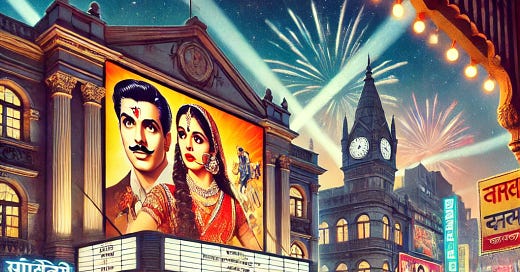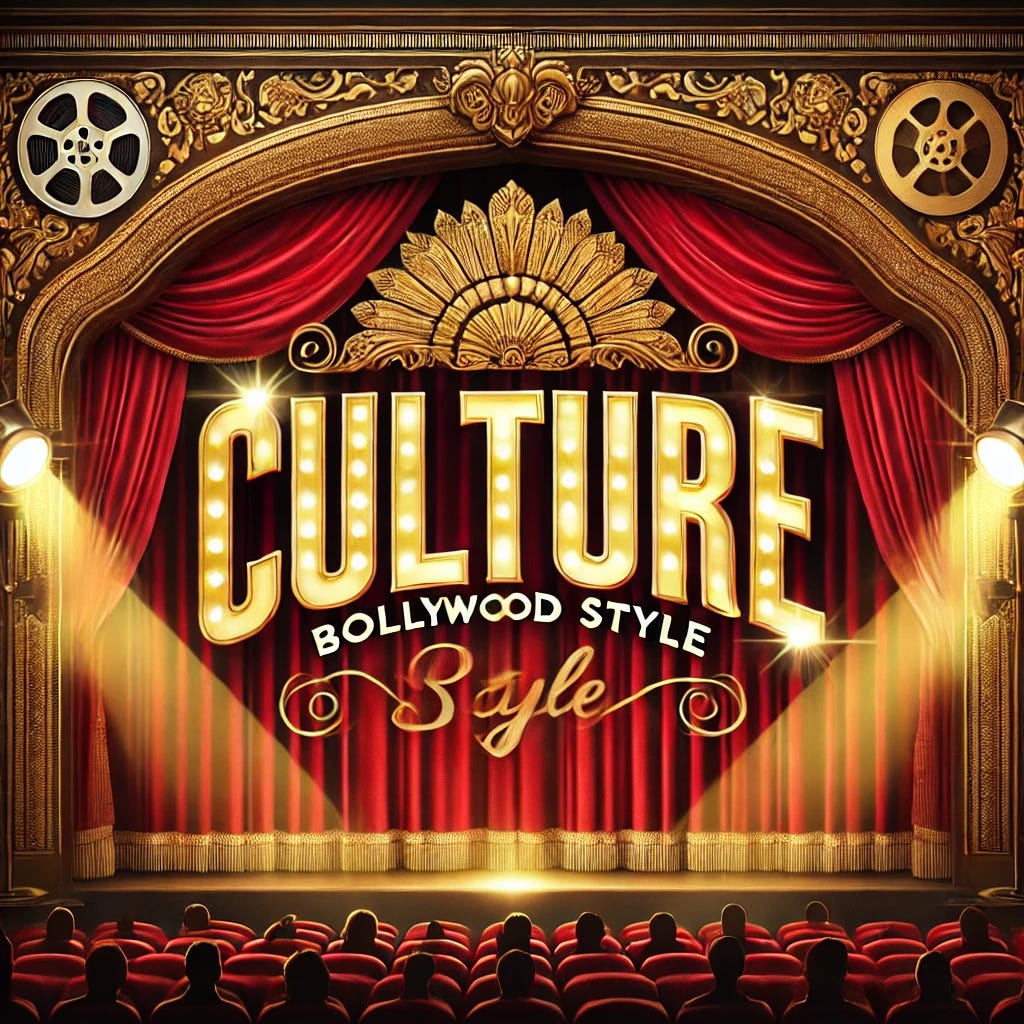Hello All!
A warm welcome to new readers!
I thought it might be fun to explore how Bollywood showcases culture through its stories. Since there are so many, I’m experimenting with this idea. If you're new to Bollywood, check out my simple guide to get started!
A Quick Low-Down:
Bollywood, based in Mumbai (formerly Bombay), is the vibrant film industry behind some of India’s most iconic stories. While not as large as Hollywood's $50 billion industry, Bollywood generates $2-$4 billion in revenue with a CAGR of 5%.. It produces 300-500 films each year and sells a staggering 2.7 billion tickets - including in U.S. theaters. Platforms like Amazon Prime and Netflix are capitalizing on its popularity by offering subtitled Indian films to global viewers.
Bollywood is more than just box office numbers; it's about culture, music, and storytelling that resonates with millions—both in India and beyond. Its reach extends to diverse regions, from Africa to Eastern Europe, the Middle East, and Asia, captivating audiences who may not even speak the language.
Its films are packed with emotion, family values, and the classic clash between good and evil. They sometimes serve as a mirror to society and an escape from it, often portraying deep moral dilemmas while also providing entertainment.
In contrast, art films are considered niche, appealing to urban elites or international audiences who seek an India that aligns with their view of ‘reality.’
For example, while Satyajit Ray’s famous Apu Trilogy by Satyajit Ray, a cornerstone of Indian cinema, it remains relatively less popular in India due to its stark, unromantic portrayal of poverty.
Now, let’s dive into one of Bollywood’s most iconic films.
Movie: The Wall (1970s)
Spoiler Alert: If you plan on watching the movie (available on Amazon Prime Video and Netflix), you may want to stop reading now! ;-)
Plot
A once-happy family is torn apart when the principled father, a blue-collar labor leader, is forced to choose between his ethics and his family’s survival. Under pressure, he signs away the workers' rights to save his kidnapped family, betraying his fellow union members.
Overcome with shame, he abandons his family and lives as a nomad, haunted by his decision.
This choice casts a long shadow over the family, especially the sons.
The eldest son, marked by trauma, is physically branded when a cruel union member tattoos the words "My father is a thief" on his arm. The humiliation hardens him. He rejects society, loses faith, and turns to the streets.
The younger son, shielded by his brother, clings to their mother’s values - honesty and hard work will see them through.
To support his mother, the elder son sacrifices his education and works at the docks, putting his younger brother through college.
But in fighting corrupt leaders and rival gangs, he is drawn into crime, lured by its quick rewards.
Lying to his family about his income source, he provides them a life of comfort, even gifting the building where his mother once worked as a maid - an attempt to erase her past indignities.
As fate (or Bollywood script writers) would have it, the youngest becomes a police officer, and is assigned to their home city of Mumbai. He soon discovers his older brother's criminal life.
At first, he tries to reform his brother before he gets pulled further into the vortex of the criminal world.
However, he is challenged by the older brother, questioning the futility of living honestly in a society that now respects him more than when he was poor.
Desperate, the younger son threatens to reveal everything to their mother. To no avail.
Soon, the younger brother unable to stomach this contradiction, decides to move out to his modest official quarters. He pleads with their mother to go with him.
When she learns the real reason behind their rift, she is heartbroken.
Her favorite—the eldest son—has betrayed her trust.
She begs him to give up the life of crime. Instead, he asks her to stand by him.
He questions her faith and asks: “What has God done for you except subject you to a life of drudgery and fear? I have given you comfort and safety. Will you really abandon me?"
In an emotional scene, the mother, deeply pained, makes her choice and walks away with her younger son.
The eldest, shattered and confused, watches her leave.
The wall between the brothers is complete.
They remain estranged, each consumed by his path.
The younger son, though firm in his beliefs, questions the cost. Did he do the right thing? His mother reassures him - his path is the right choice, no matter how painful.
The two brothers continue to try and influence the other to their point of view.
In another iconic moment in their conflict, the elder brother asks: “I have wealth, status, and power. What do you have ?”
The younger brother answers: "I have mother."
Then fate intervenes again.
Their father is found dead on a train. Their mother falls critically ill.
The elder brother, urged by doctors to pray, turns to God for the first time. Miraculously, she survives. This moment shakes him. He decides to change, especially when he also learns he is going to be a father.
But tragedy strikes.
Rival gangsters murder his pregnant fiancée, sending him on a vengeful rampage.
In the climactic police chase, the younger brother shoots him, severely wounding him.
Injured, the son manages to find his mother at the temple, praying for him, and collapses in her arms, dying as the younger brother watches in remorse.
Cultural Takeaways
This film is considered a classic for its stellar cast, memorable dialogues, and powerful storyline. It delves into familiar themes: the unfairness of life, the conflict between right and wrong, ethical dilemmas, the temptation of quick wealth, the clash of values, the influence of environment in shaping character, familial responsibilities, and the hypocrisy of society.
The movie also reflects common cultural norms:
Older siblings often sacrifice their own aspirations to support their families, taking on burdens that fall upon them by necessity rather than choice.
It is customary for adult children to have their parents live with them as part of an extended family.
At the heart of the story is the mother—selfless, resolute, and the family’s moral anchor. In a patriarchal society, mothers remain highly revered and often set the ethical boundaries for their children.
Society can be unforgiving, and dishonor is often considered worse than death.
Above all, the film reinforces timeless lessons:
The path of righteousness, guided by honesty and truth, must never be abandoned.
Sacrifice is an inherent part of this journey.
Love cannot be blind when the loved one is on the wrong path.
People must atone for their choices, but redemption is always possible.
Even when the lines between good and evil seem blurred, the hero’s journey remains one of duty, sacrifice, and choosing what is right—no matter the cost.
Fate and faith are essential to the journey. For millions, belief in a powerful and forgiving God is a lifeline in an often merciless world.
This is the morality embedded in ancient texts woven into Bollywood storytelling!
I hope you liked this different lens into the Indian culture!







Two of my favorite takes on Bollywood. The old and the new. Both wonderful.
https://www.youtube.com/watch?v=jF5uaqjySqQ
https://www.youtube.com/watch?v=9k7mPFeJgJs
Maybe there is a Bollywood stars walk of fame in Mumbai?